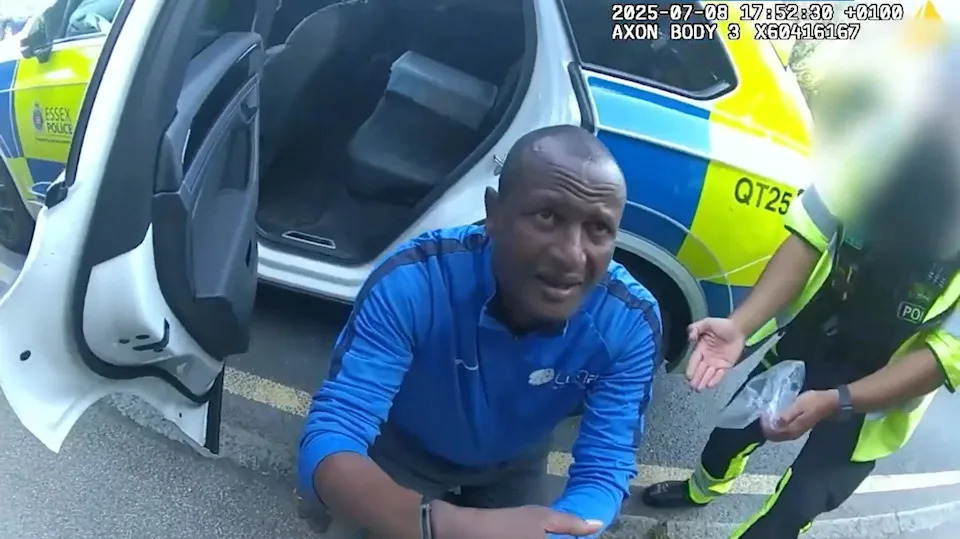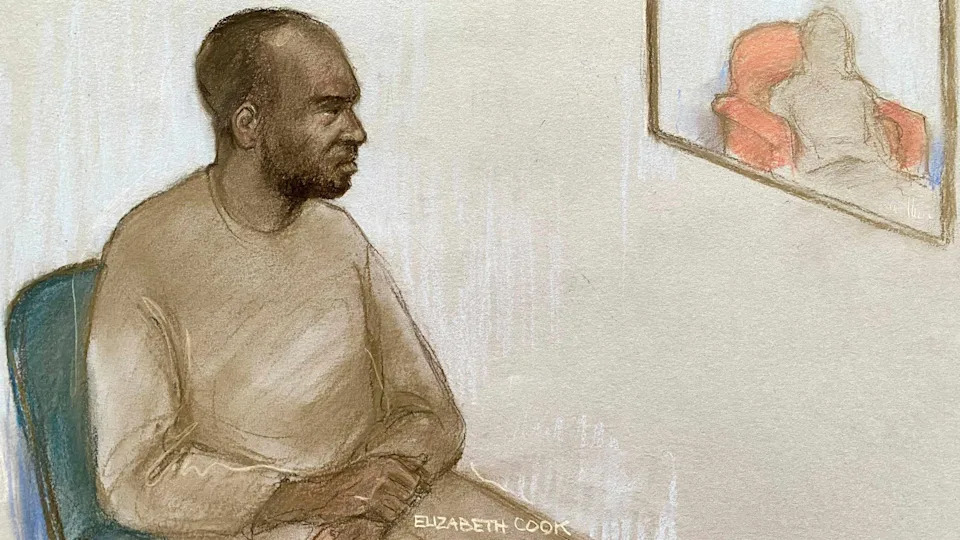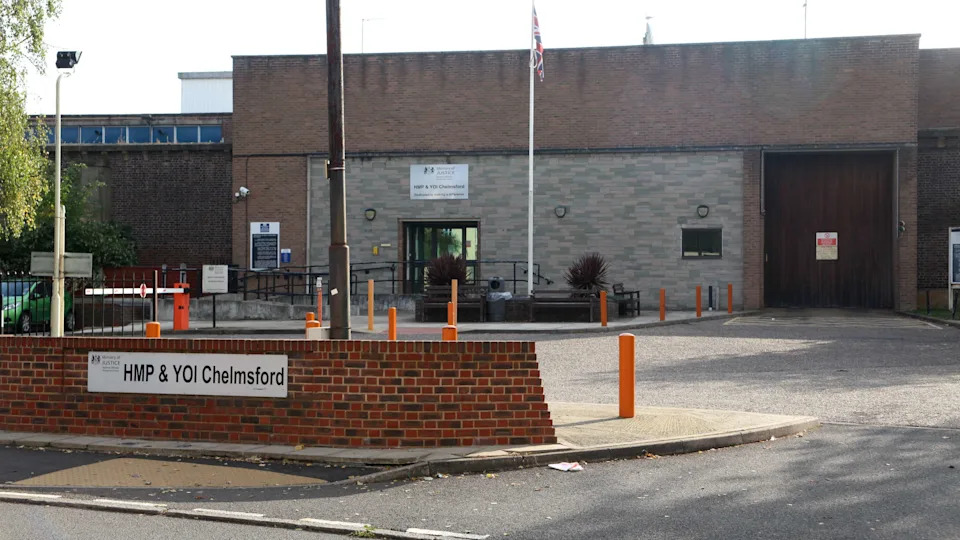An asylum seeker and convicted sex offender who was mistakenly released from prison will be deported this coming week, the justice secretary has said.
Hadush Kebatu was arrested in the Finsbury Park area of London on Sunday morning, three days into a manhunt after being wrongly freed from HMP Chelmsford on Friday morning instead of being sent to an immigration detention centre.
The Ethiopian national, whose crimes sparked protests outside migrant hotels across the country, was jailed for 12 months in September for the sexual assault of a 14-year-old girl.
A prison officer has been taken off duties to discharge prisoners while an investigation into how Kebatu had been released by mistake takes place.
Following his arrest, David Lammy said he expected the 41-year-old to be deported this week, with the justice secretary telling broadcasters outside Wood Green police station: “I can assure you that he will be deported as he was expected to be deported. I expect that to happen this week.”
Prime minister Keir Starmer said earlier that Kebatu “will be deported” and “we must make sure this doesn’t happen again”.
The father of Kebatu’s teenage victim said he hoped he would be “deported immediately”.
In a statement read out by Epping Forest councillor Shane Yerrell, the father said the news of Kebatu’s release caused his daughter “so much stress and anxiety”.
He added: “This man is a real danger to young women and children and for him to be wrongly released and walking the streets freely just four months after carrying out two sexual assaults, only five weeks after being sentenced, all because of a system failure on Friday is unbelievably irresponsible.”
Here’s what we know about the investigation into Kebatu and the prison system’s blunder in releasing him.
Who is Hadush Kebatu?
Kebatu, 41, was understood to have crossed the English Channel in a small boat to enter the UK on June 29.
He had travelled more than 5,000 miles through Sudan, Libya, Italy and France, and paid 2,500 euro (£2,155) to cross the Channel in a “rubber dinghy”, before being housed in the Bell Hotel in Epping, Essex.
On 7 July, just eight days after his arrival in the country, Kebatu was offered pizza by a 14-year-old girl sitting on a bench, his trial at Chelmsford Magistrates’ Court was told.

Police body-cam footage shows Hadush Gerberslasie Kebatu being arrested in July. (Alamy)
He responded by making inappropriate comments to her, such as “come back to Africa, you would be a good wife”, and “do you want to come to the Bell Hotel to have babies then we could go to Kenya with each other?” before he tried to kiss her, the court heard.
The trial also heard that a day later, he sexually assaulted a woman in Epping by trying to kiss her, putting his hand on her leg and telling her she was pretty.
This woman then later spotted him being inappropriate to the same teenage girl, who was wearing her school uniform, and called 999, which led to his arrest.
Kebatu was found guilty of two counts of sexual assault, one count of attempted sexual assault, one count of inciting a girl to engage in sexual activity, and one count of harassment without violence and was jailed in September for 12 months.
Watch: CCTV footage shows Hadush Kebatu at large after mistaken release
Kebatu, who claimed to be a “teacher of sports” in his home country, had a “firm wish” to be deported, the court was told at his sentencing hearing.
He said of his charges: “I can’t do these kind of things, this is anti-Christian – these are just children, innocent children.”
However, the Probation Service was not convinced and described Kebatu as “manipulative”.
Why was he released from prison?
Kebatu was released from HMP Chelmsford on Friday, when he was supposed to be sent to an immigration detention centre for deportation.
It is understood that Kebatu left prison with an amount of personal money but was not given a discharge grant to cover subsistence costs.
A delivery driver described seeing Kebatu return to HMP Chelmsford in a “very confused” state “four or five times”, only to be turned away by prison staff and directed to the railway station.
The driver, named only as “Sim”, told Sky News he saw Kebatu come out of the prison saying: “Where am I going? What am I doing?”
He said prison staff were “basically sending him away” and saying to him, “Go, you’ve been released, you go”.

A court artist sketch by Elizabeth Cook of Hadush Kebatu. (Alamy)
Kebatu took a train from Chelmsford to Stratford, east London, on the day of his wrongful release. He was arrested in the Finsbury Park area of London at around 8.30am on Sunday, after police received information from the public.
Describing how he saw Kebatu being led out by police, eyewitness Jack Neill-Hall, 40, said: “He wasn’t struggling, he was walking quite calmly, a bit dejectedly, he was staring down, he had his hood up, but it was a calm situation.
“It was a leisurely stroll out of the park with him with his hands cuffed but he wasn’t trying to get away.”
Kebatu will be returned to the custody of the prison service, the force said. A prison officer has been taken off duties to discharge prisoners while an investigation takes place.
Government has ‘serious questions to answer’
Liberal Democrat MP for Chelmsford Marie Goldman called for a “rapid” national inquiry into the blunder.
“It’s unacceptable that the safety of my constituents, and the people of London, was ever put at risk. The Prison Service had several chances to fix it and failed.

A prison officer as HMP Chelmsford has been suspended, but calls for further accountability have been made. (Alamy)
“The government has serious questions to answer and major work to do to make the system fit for purpose. It certainly isn’t at the moment.”
Speaking to Sky News, Reform UK’s head of policy Zia Yusuf likened the mistake to a “Monty Python sketch”, while Tory shadow home secretary Chris Philp said Kebatu’s release was “staggering incompetence”.
The father of Hadush Kebatu’s teenage victim was alerted to the prisoner’s mistaken release by a reporter and said he was “greeted with hostility” when he went to HMP Chelmsford for answers.
He said in a statement read out by councillor Shane Yerrell: “Myself and my family feel massively let down and infuriated by HMP Chelmsford, the police, the justice system and our Labour Government. They have all failed, not just us as a family, but they have failed everyone in the country.
“I had to find out from a reporter that my daughter’s attacker was accidentally released in the day, then be sent images and videos of him walking around throughout the day before the police even alerted her mother. Then later that day when I attended HMP Chelmsford to seek some answers I was greeted with hostility and complete disregard for anything I said or asked, totally disrespecting me and my family.”
How often are prisoners being released by mistake?
Chief inspector of prisons Charlie Taylor has suggested mistakenly freeing prisoners has become more common because of changes to how early releases happen.
“Once there is a tried and tested formula in place and people are used to running it, then there are fewer mistakes,” he told Times Radio.
“It’s become more complicated over the years and it’s become a movable feast which again for those whose job it is to calculate sentences becomes more complicated.
“In this particular case also there will be questions about communication between the prison and the Home Office, and whether that was done in a streamlined way.”

CCTV images show Hadush Kebatu in his grey tracksuit following his release. (Met Police)
Taylor said another common issue is “fairly inexperienced staff” doing “what is a fairly complex task often under huge pressure of time”, adding that this leads to “more mistakes being made”.
His Majesty’s Prison and Probation Service data shows 262 prisoners were released in error from April 2024 to March 2025, up from 115 in the year to March 2024.
The service said in a report that releases in error “remain infrequent” and that it believed the rise is linked to changes in the law and the early release scheme introduced by Labour in September 2024.
How Kebatu’s crimes sparked protests across the UK
Kebatu’s crimes led to protesters and counter-protesters taking to the streets in Epping, Essex, and eventually outside hotels housing asylum seekers across the country.
A number of arrests were made over violent disorder related offences during the protests, which saw clashes with police and counter-protesters.

Police hold back protesters in Epping, Essex, in August. (Alamy)
During his trial, Judge Christopher Williams told him that he must have been aware of the unrest his actions had caused, and how it impacted law-abiding asylum seekers.
“You could not have anticipated that your offending behaviour … would have caused such a response from the public, particularly in Epping, but also across the UK, resulting in mass demonstrations from a fear that children within the UK are not safe,” the judge said.
It also led to a temporary injunction being granted at the High Court blocking the accommodation of asylum seekers at the Bell Hotel, although this was later overturned by the Court of Appeal.
Read more
